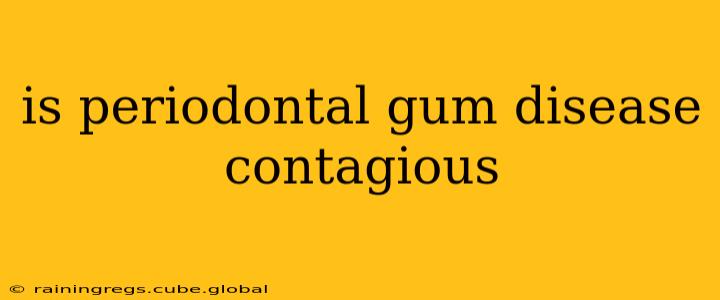Periodontal disease, also known as gum disease, is a common infection affecting the gums and supporting structures of the teeth. While not directly contagious in the same way as a cold or flu, there's a growing body of research suggesting a link between certain bacteria associated with periodontal disease and its potential transmission. Let's delve deeper into this complex issue.
Can Periodontal Disease Be Spread Through Saliva?
This is a frequently asked question, and the answer is nuanced. While periodontal disease itself isn't transmitted like a virus, the bacteria responsible for its development can be shared through saliva. Several specific bacteria, such as Porphyromonas gingivalis, are strongly implicated in the progression of periodontitis (the more severe form of gum disease). These bacteria can be transferred through close contact, such as kissing or sharing utensils. However, this doesn't automatically mean that someone will develop gum disease.
What Factors Influence the Development of Periodontal Disease?
The development of periodontal disease is a complex process influenced by multiple factors, making it difficult to definitively label it as "contagious." While bacterial transfer is a possibility, an individual's own immune response plays a crucial role. Individuals with weakened immune systems or pre-existing conditions may be more susceptible to developing periodontal disease after exposure to these bacteria.
Other significant risk factors include:
- Poor oral hygiene: Insufficient brushing and flossing allow bacterial plaque to accumulate, leading to inflammation and gum disease.
- Smoking: Smoking significantly increases the risk and severity of periodontal disease.
- Genetics: A family history of periodontal disease can increase your risk.
- Systemic diseases: Conditions like diabetes and cardiovascular disease can exacerbate gum disease.
- Stress: Chronic stress can weaken the immune system, making individuals more vulnerable to infection.
Is it possible to catch gum disease from someone else?
While you can't "catch" periodontal disease in the same way you catch the flu, the bacteria associated with it can be transmitted through close contact. However, the likelihood of developing the disease depends heavily on individual susceptibility and other contributing factors. Simply sharing a utensil with someone who has gum disease does not guarantee you will develop it.
How can I protect myself from periodontal disease?
The best way to protect yourself from periodontal disease is to practice excellent oral hygiene:
- Brush your teeth twice a day: Use a fluoride toothpaste and brush gently for at least two minutes.
- Floss daily: Flossing removes plaque from between teeth where your toothbrush can't reach.
- Use mouthwash: An antibacterial mouthwash can help reduce bacteria in your mouth.
- Regular dental checkups: See your dentist for professional cleanings and examinations at least twice a year. Early detection and treatment are key to managing periodontal disease.
What are the symptoms of periodontal disease?
Recognizing the symptoms of periodontal disease is crucial for early intervention. These can include:
- Bleeding gums: This is often an early warning sign.
- Swollen or red gums: Inflammation indicates an infection.
- Receding gums: Gums pulling away from the teeth exposes the roots, making them vulnerable.
- Persistent bad breath: Bacteria contribute to bad breath.
- Loose teeth: Advanced periodontal disease can weaken the support structures of the teeth.
In conclusion, while the bacteria associated with periodontal disease can be transmitted, it's more accurate to say it's influenced by bacterial transmission rather than being directly contagious. Maintaining good oral hygiene and regular dental checkups are the most effective ways to prevent and manage this common condition. If you have concerns about periodontal disease, consult your dentist for personalized advice and treatment.
